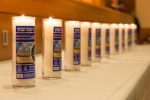Jewish tradition says that the chanukiyah should be illuminated in a window where it can be seen from the outside. This intersection of private celebration and public visibility is part of the holiday and, in places like Canada, where multicultural diversity is celebrated, this tradition fits nicely with the idea that we should all be proud of our various heritages.
The intersection of religiosity and public life, while not exactly parallel to this example, was addressed in a newly released study that threw a lot of accepted wisdom into doubt. The Vancouver-based Angus Reid Institute, in partnership with Cardus, a non-partisan, faith-based think tank, undertook a study on faith in the public square – and it appears almost everyone was surprised by some of the conclusions.
The study included a survey of 2,200 people across Canada, who responded to questions about their attitudes toward religion and its role in aspects of public life. The respondents divided quite neatly into thirds: the researchers identified public faith proponents (37% of the population), public faith opponents (32%) and the uncertain (32%).
Respondents were asked what they thought of the role of faith in areas such as education, social services, healthcare (such as hospitals, clinics and homes for the aged) and social justice causes (such as poverty, peace and overseas development). Overall, Canadians would like to see less faith-based involvement in these issues (56% of respondents say this), while 44% would like to see more influence. What surprised researchers, though, was who fell into the various categories.
“Notably, the results may challenge a traditional view of who Canadians within the proponent group are,” says the introduction to the study’s findings. “While one may assume this group is more likely to be made up of older and more Conservative-voting Canadians, this study finds proponents more likely to be younger, more highly educated, and largely Liberal-supporting.”
The authors continue: “This suggests that a range of Canadians – not just the highly religious – appear willing to accept certain elements of faith in public life. In fact, one-quarter of those who are most accepting of public faith have never read a religious text. Similarly, those with more strongly held religious beliefs may not necessarily be accommodating of the beliefs of others, or want to see them participating in the public discourse.”
The study’s authors seem to infer that some religious Canadians might seek to limit faith-based involvement in public life if it is extended to religious groups other than their own.
More interesting, perhaps, is the flip side: younger, more highly educated and apparently liberal (or, as the study categorized them, Liberal) Canadians who do not choose to participate in a religious tradition themselves can nevertheless see value in faith-based organizations doing good things for society. Why?
While we do not have the opportunity to probe the reasons for respondents’ answers, the surprise result might make more sense if we assume that, as multiculturalism has encouraged Canadians to recognize and celebrate difference in our heritages and traditions, a similar openness to difference has imbued itself in our attitudes to religious difference. Canadians, in general, may be less religiously affiliated, but we may, at the same time, be more open to accepting the presence of the religiosity of others – and their engagement in the delivery of public services.
Most people can probably understand that a person who has lived their lives observing Jewish traditions would, later in life, seek an assisted living or care facility that reflects their identity rather than one where the food choices, holiday celebrations and other cultural activities accentuate their difference and make them feel like outsiders. Similarly, it is natural, when in need, to seek help from an agency that is part of the community to which one belongs. Probably because we know that government cannot do all things for all people – perhaps in the roaring economy of the 1950s and ’60s we may have thought so, but those days are over – we recognize that, whatever theological differences we have, religious organizations are irreplaceable partners in caring for the sick, in-need and at-risk in our society.
Jews in North America, particularly in the United States, have been at the forefront of the movement to ensure the separation of church and state. There should certainly be vigilance against any creeping proselytization or overt theological mission within the delivery of public services. But we should recognize the difference between that and the positive impacts that people of various faith traditions have in dedicating themselves to good works. We call it tikkun olam and probably every religion has its parallel. Even as Canadians in general become less religious, it turns out we may be increasingly willing to see faith-based organizations deliver services that make our communities better.






